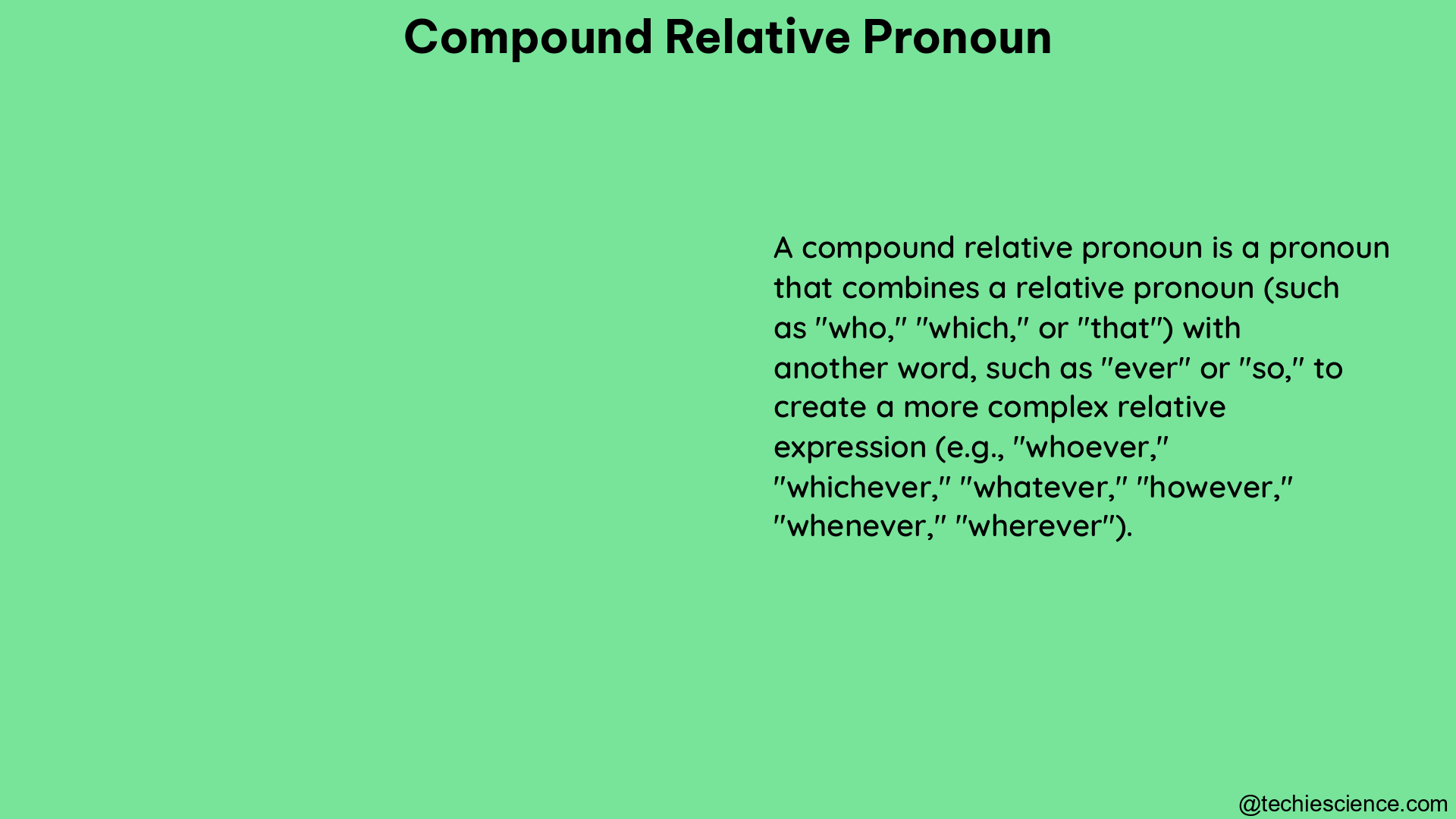Compound relative pronouns are a unique and versatile class of pronouns in the English language. These pronouns combine the functions of a relative pronoun and another word, typically an adverb or adjective, to connect a dependent clause to an independent clause and provide additional information about the subject or object of the sentence. In this comprehensive guide, we will delve into the intricacies of compound relative pronouns, exploring their usage, examples, and the nuances that make them an essential tool in effective communication.
Understanding Compound Relative Pronouns
Compound relative pronouns are a type of pronoun that serve a dual purpose. They not only act as a subject, object, or adverb within their own clause but also function as a conjunction, linking the dependent clause to the main clause. This dual role allows for more concise and expressive sentence structures, enabling writers and speakers to convey complex ideas with clarity and precision.
Characteristics of Compound Relative Pronouns
- Combination of Functions: Compound relative pronouns combine the roles of a relative pronoun and another part of speech, such as an adverb or adjective.
- Connecting Clauses: These pronouns connect a dependent clause to an independent clause, providing additional information about the subject or object.
- Unspecified Identity: Compound relative pronouns often indicate that the specific identity or details are not important, focusing instead on the broader context or situation.
- Versatility in Usage: Compound relative pronouns can be used in a variety of contexts, from informal conversations to formal academic writing.
Common Compound Relative Pronouns

The most commonly used compound relative pronouns in English are:
- Whoever
- Whomever
- Whichever
- Whatever
- However
- Whenever
- Wherever
Let’s explore each of these compound relative pronouns in detail, including their usage and examples.
Whoever
Usage: “Whoever” is used to refer to an unspecified person or people, often indicating that the identity is not important.
Example: “Whoever comes to the party will be welcomed as a friend.”
In this example, “whoever” connects the dependent clause “Whoever comes to the party” to the independent clause “will be welcomed as a friend,” indicating that the specific identity of the person coming to the party is not relevant.
Whomever
Usage: “Whomever” is used as the object of a sentence, referring to an unspecified person or people.
Example: “They always mistreated whomever they encountered.”
In this example, “whomever” serves as the object of the verb “mistreated,” connecting the dependent clause “whomever they encountered” to the independent clause “They always mistreated.”
Whichever
Usage: “Whichever” is used to refer to an unspecified thing or option.
Example: “I will eat at whichever restaurant you prefer.”
In this example, “whichever” connects the dependent clause “whichever restaurant you prefer” to the independent clause “I will eat at,” indicating that the specific restaurant choice is not important.
Whatever
Usage: “Whatever” is used to refer to an unspecified thing or situation.
Example: “My parents will be happy with whatever career I choose.”
In this example, “whatever” connects the dependent clause “whatever career I choose” to the independent clause “My parents will be happy with,” suggesting that the specific career choice is not the primary concern.
However
Usage: “However” is used to indicate a condition or manner.
Example: “However much she eats, she never gains weight.”
In this example, “however” connects the dependent clause “However much she eats” to the independent clause “she never gains weight,” indicating the manner or condition in which the independent clause is true.
Whenever
Usage: “Whenever” is used to indicate a time or frequency.
Example: “Whenever I go to Bangalore, I try to spend a few days with my grandparents.”
In this example, “whenever” connects the dependent clause “Whenever I go to Bangalore” to the independent clause “I try to spend a few days with my grandparents,” specifying the time or frequency of the action.
Wherever
Usage: “Wherever” is used to indicate a location.
Example: “Wherever you go, I will follow you.”
In this example, “wherever” connects the dependent clause “Wherever you go” to the independent clause “I will follow you,” indicating the location where the action of the independent clause takes place.
Compound Relative Pronouns in Context
Compound relative pronouns can be used in a variety of contexts, from informal conversations to formal academic writing. They are particularly useful in situations where the specific identity or details are not important, allowing the speaker or writer to focus on the broader context or situation.
Informal Conversations
In casual conversations, compound relative pronouns can help to streamline speech and convey ideas more efficiently. For example:
“Whoever wants to go to the movies with me, let me know.”
“I’ll eat whatever you’re having for lunch.”
“Whenever you’re free, let’s grab a coffee.”
Formal Writing
In formal writing, such as academic essays or research papers, compound relative pronouns can be used to maintain a clear and concise writing style while providing additional information about the subject or object. For example:
“Whichever approach the researchers choose, it must be well-justified and supported by the data.”
“However the participants responded to the survey, the results will be analyzed to identify any significant trends.”
“Wherever the study was conducted, the researchers ensured that the environment was controlled and consistent.”
Mastering Compound Relative Pronouns
To effectively use compound relative pronouns, it’s important to understand the nuances of their usage and the specific contexts in which they are most appropriate. Here are some tips to help you master the use of compound relative pronouns:
- Identify the Relationship: Determine the relationship between the dependent clause and the independent clause, and choose the appropriate compound relative pronoun to connect them.
- Consider the Function: Understand whether the compound relative pronoun is serving as a subject, object, or adverb within the dependent clause.
- Maintain Clarity: Ensure that the use of the compound relative pronoun does not create ambiguity or confusion in your writing or speech.
- Practice, Practice, Practice: Regularly incorporate compound relative pronouns into your writing and speaking to become more comfortable and confident in their usage.
By mastering the use of compound relative pronouns, you can enhance the clarity, precision, and expressiveness of your communication, whether in formal or informal settings.
Conclusion
Compound relative pronouns are a powerful tool in the English language, allowing speakers and writers to connect clauses, provide additional information, and convey complex ideas with concision and clarity. By understanding the characteristics, common examples, and appropriate usage of compound relative pronouns, you can elevate your communication skills and become a more effective and engaging communicator.
References:
- English Practice. (n.d.). Compound Relative Pronouns. Retrieved from https://www.englishpractice.com/improve/compound-relative-pronouns/
- YouTube. (2022). What Is Compound Relative Pronoun Definition And Example. Retrieved from https://m.youtube.com/watch?pp=ygUQI2NvbXBvdW5kcHJvbm91bg%3D%3D&v=eliQyNu_SLs
- Magoosh. (n.d.). Relative Pronouns: How to use them in English. Retrieved from https://magoosh.com/english-speaking/relative-pronouns-how-to-use-them-in-english/

Hi! I am Bhabesh Sing. I have completed M.A in English, M.A in Vocal Music, and B.Ed. I am a creative writer. Currently, I am a Subject Matter Expert in English on this Platform.
Let’s connect through LinkedIn-https://www.linkedin.com/in/bhabesh-sing-660914ab